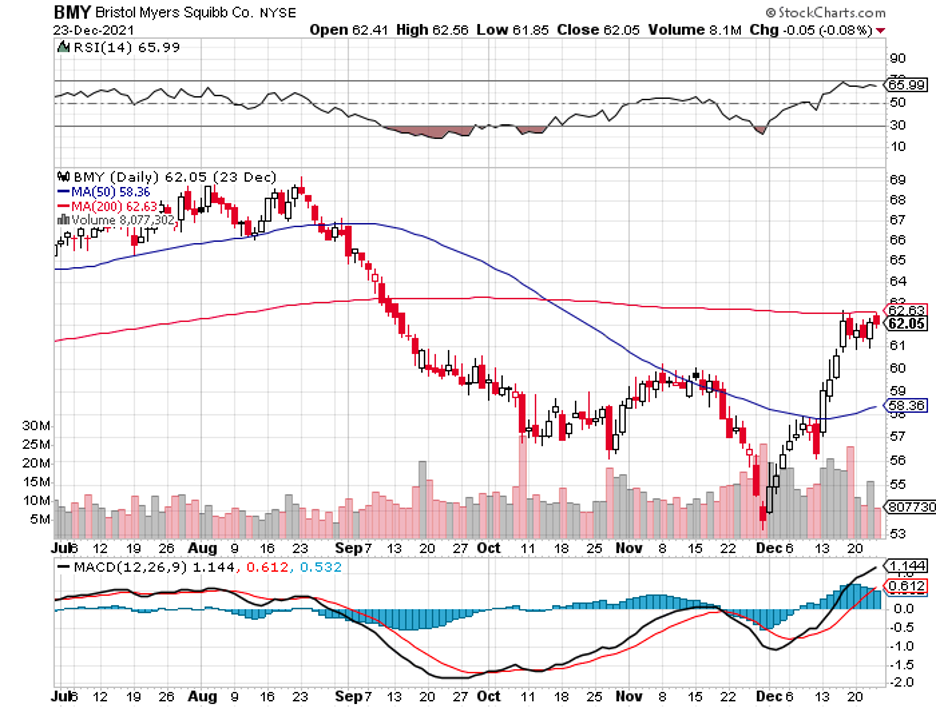Another Victim of Overblown Fears
Inflation is one of the primary concerns of investors these days, and rightly so.
Just last month, the consumer price index (CPI) climbed at an astonishing 6.8% year over year — the highest increase ever recorded in almost four decades.
In response, many investors have decided to focus their attention on stocks that protect their portfolios from inflationary pressures.
While some are looking at cryptocurrencies and, of course, gold as their preferred hedges against inflation, I don’t think it’s wise to ignore dividend stocks.
History dictates that stocks that offer above-average dividend yields have been known to surpass expectations during the difficult periods of high inflation.
An excellent example of this is Bristol Myers Squibb (BMY).
BMY is one of the biggest names in the healthcare sector, with a market capitalization of over $125 billion.
Unfortunately, BMY’s shares have experienced a 9% fall in 2021 to date.
The company has also been underperforming compared to the broad market, which went up by more than 20% during the same period.
While this is unfavorable for investors who bought BMY in 2020, the current situation offers an attractive entry point for those looking to inject new money here.
Looking at the reasons for BMY’s relatively weak performance, one key point to consider is that the company is a major player in an industry that is not particularly sought after at the moment.
This year, most investors poured money on stocks that would benefit firsthand from the reopening efforts of the economy.
Consequently, the dependable, non-cyclical healthcare and biotechnology sectors have been generally disregarded—barring the COVID-19 vaccine stocks like Pfizer (PFE), BioNTech (BNTX), and Moderna (MRNA).
Apart from that, some company-specific issues plagued BMY as it faces impending patent expirations on a few key products in the following years.
Oral cancer drug Revlimid, which generated $12.1 billion in 2020, is expected to face patent loss by 2025.
Meanwhile, blood clot treatment Eliquis, which raked in $9.2 billion last year, will be dealing with the same issue by 2027.
This will be followed by lung cancer medication Opdivo, which recorded $7 billion in sales, in 2028.
Taken together, these key drugs generate roughly $28 billion in annual revenue, which comprises more than half of the company’s $46 billion revenue per year.
While this can be a cause of concern, it doesn’t necessarily mean that these products will generate zero revenues for the company when their patents expire.
In fact, a previous study revealed that top-selling drugs typically lose about 50% of their sales in the 5 years after their patent expiration.
That means that BMY can still expect well above $10 billion each year from these three key drugs through the 2020s.
Moreover, worries over the patent expirations appear to be overblown, considering that these will happen several years from now. Considering that BMY has an extensive list of growth assets and a robust pipeline, I think this situation has been more than accounted for.
The fear of patent expirations is well-founded, though. If companies fail to navigate a patent cliff, it can have serious ramifications for a company
However, a company that’s well-diversified and wisely invests in lucrative growth assets in advance of these impending patent expirations—even the losses of exclusivity of top-selling drugs—can handle the situation easily.
So far, BMY has shown three clear ways in terms of handling patent losses. One is expanding the indications of their newer drugs. Another is launching new products to the market. The third is acquiring new assets through beneficial deals.
The first cluster of drugs that BMY has brought to market and is growing rapidly includes anemia medication Reblozyl, which recorded an impressive 67% increase in its revenue in the third quarter of 2021
This translated to $160 million, or over $600 million in annual sales.
Recently, the FDA has accepted BMY’s collaboration with Merck (MRK) to use Reblozyl as part of the treatment for beta-thalassemia. The approval for this work is anticipated to be released by the second quarter of 2022.
Following this growth rate, it wouldn’t be a surprise to discover in the future that Reblozyl has transformed into a blockbuster drug with yearly sales reaching over $1 billion.
Another potential blockbuster is multiple sclerosis treatment Zeposia, which has boosted its sales 20x since 2020.
While it started from a low base of $2 million, this drug has the ability to reach peak sales of $5 billion annually.
Aside from these, BMY has a deep pipeline filled with drugs holding blockbuster potential in the coming years.
Meanwhile, BMY just hiked its dividend by 10%, pushing its dividend yield to 3.5%—easily doubling what investors can receive from the broad market, with the S&P yielding 1.3%.
In terms of its acquisitions, BMY has been on a buying spree lately. The most massive deal following its $75 billion acquisition of Cologne is its $13 billion deal with MyoKardia.
Simply put, BMY is cheap. At current prices, this healthcare company is trading at only 7.5x this year’s earnings, while the estimates for 2022 look to be even lower.
However, BMY is an impressive company with a remarkable portfolio of assets.
Moreover, the impending patent losses of its top-performing drugs have already been dealt with thanks to the company's solid revenue replacement strategy.
Hence, this issue should no longer sound any alarm bells.
Overall, BMY is an attractive option for the long-term and buy-and-hold type of investors, particularly those aiming for a sizable and steadily growing dividend stream.

